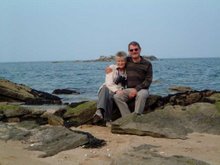I hasten to add that Jane is wearing a money pouch (21st century equivalent of the sporran), not a red leather bikini over her trousers: it’s not that sort of holiday.
We are driving up Etna’s northern slope where the road
reaches 6,000 feet plus before descending, 20 miles farther on. The mountain peak
is much higher at 10,900 feet and the upper slopes are attainable by cable car
from the southern side. Since 1979 tourists can’t ascend the final 1,000 feet to
the top because it’s too dangerous: 9 tourists were killed that year on the
main crater lip. We’re not doing the cable car run as it’s too cold in winter and
the lofty parts are mostly covered by clouds. They were today, so we made the
right choice.
The road width and surfaces are good in spite of the seismic
challenges, and we climb steadily until the route cuts through a huge lava
field. This was the last major eruption, in 2002. The lava runs for many miles
and the volume of out-pouring is vast. Here are a few photos that don’t really do
it justice.
The dots on the skyline are actually people, so gives some
idea of scale. We carry on driving up to the top and what happens to be the
snow line. It seems, by the inactive ski lift and the bare snow poles on either
side of the road, that maybe they haven’t had much snow this year. Anyway,
there’s enough for a snap of me on an old grubby patch of it. I’m trying not to
look like an old grubby poser.
There’s a lot more snow higher up, visible intermittently between
the swirling clouds. It looks quite dramatic over the top of the lava flow, a
bit like pictures of the Earth seen from space.
The whole of the lower slopes below the snow line are densely
wooded, apart from what the lava has claimed. Below about 3,000 feet there are
also many villages, some of which have suffered severe damage from eruptions. I
wonder why people would want to live in such a dangerous area. Maybe to get the
benefit of free underfloor heating!
Etna has more to offer: walking trails, visits to craters,
gorges, and wildlife, but winter is not the best time for ordinary tourists
like ourselves to be exploring high mountains. It was, nevertheless, an
absorbing peek into a very different environment. A far cry from the Guy Fawkes
firework called Mount Etna shaped like a cone that roared up a column of sparks
for a minute or so to parody an eruption.







No comments:
Post a Comment